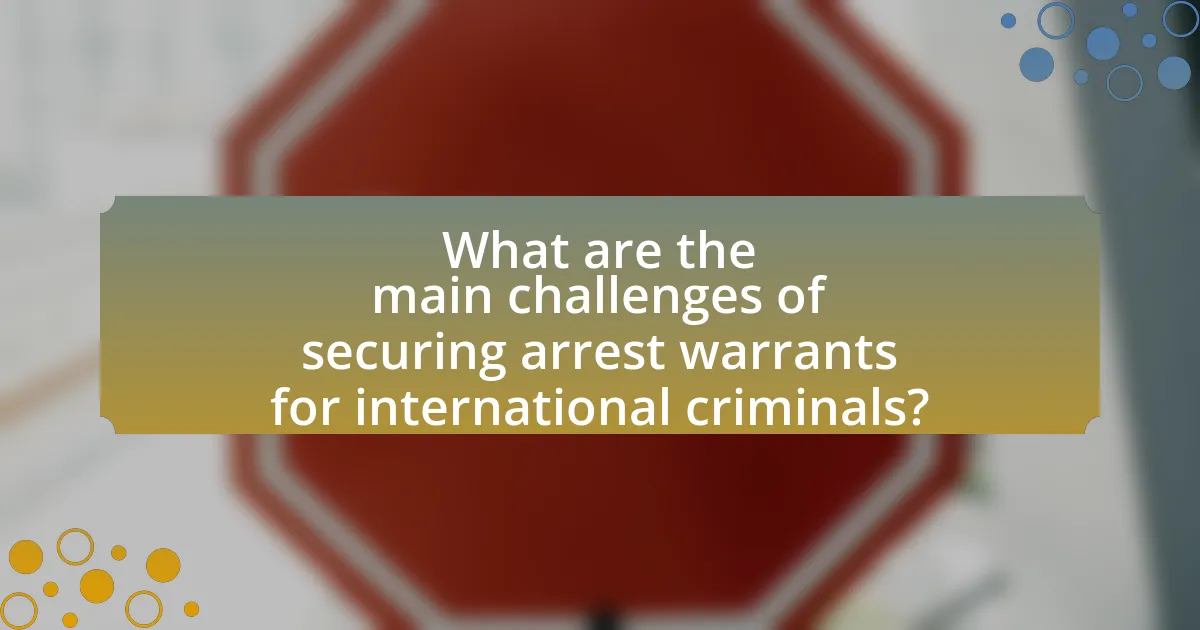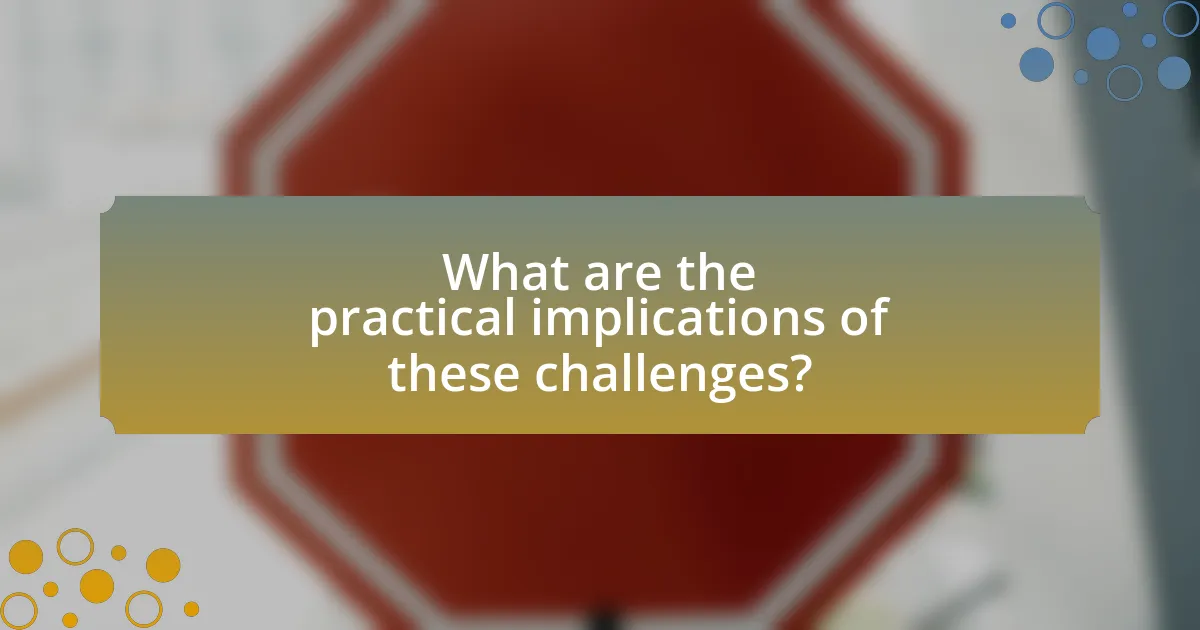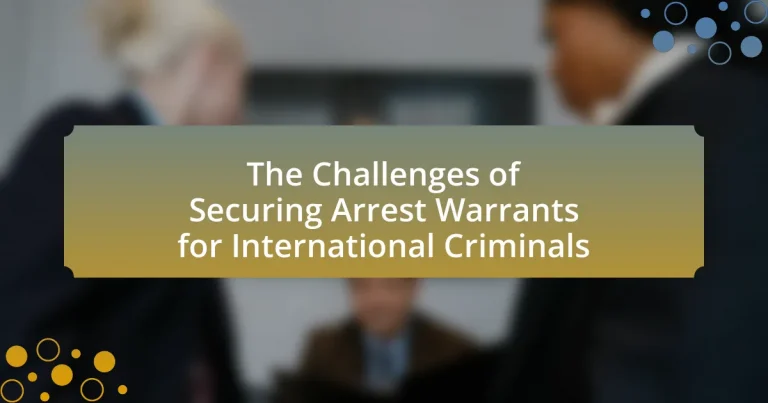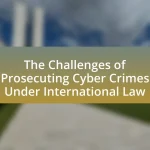The article examines the challenges associated with securing arrest warrants for international criminals, highlighting jurisdictional issues, lack of cooperation among countries, and legal complexities. It discusses how varying national laws and political considerations impact the issuance and execution of warrants, as well as the role of international treaties in facilitating cooperation. Additionally, the article addresses the implications of these challenges on law enforcement agencies, victims, and the overall effectiveness of international justice systems, while proposing strategies to enhance collaboration and streamline the warrant process through technology and training.

What are the main challenges of securing arrest warrants for international criminals?
Securing arrest warrants for international criminals faces significant challenges primarily due to jurisdictional issues, lack of cooperation among countries, and legal complexities. Jurisdictional issues arise because different countries have varying laws and standards for issuing warrants, which can lead to conflicts and delays. Lack of cooperation among nations often stems from political considerations, differing legal systems, and concerns over sovereignty, making it difficult to execute warrants across borders. Legal complexities include the need for substantial evidence that meets the standards of the requested country, as well as navigating international treaties and agreements, such as the European Arrest Warrant or mutual legal assistance treaties, which can complicate the process further. These factors collectively hinder the timely and effective issuance of arrest warrants for international criminals.
How do legal frameworks impact the issuance of arrest warrants?
Legal frameworks significantly influence the issuance of arrest warrants by establishing the legal standards and procedures that must be followed. These frameworks dictate the requirements for probable cause, the types of evidence needed, and the jurisdictional authority necessary to issue a warrant. For instance, in the United States, the Fourth Amendment requires that warrants be supported by probable cause and issued by a neutral judge, ensuring that the rights of individuals are protected. This legal requirement can complicate the process of securing arrest warrants for international criminals, as different jurisdictions may have varying standards and procedures, leading to potential conflicts and delays in enforcement.
What international treaties govern the issuance of arrest warrants?
The international treaties that govern the issuance of arrest warrants include the United Nations Convention Against Transnational Organized Crime, the United Nations Convention Against Corruption, and the Rome Statute of the International Criminal Court. These treaties establish frameworks for cooperation among states in the apprehension and prosecution of individuals accused of serious crimes. For instance, the Rome Statute provides the legal basis for the International Criminal Court to issue arrest warrants for individuals charged with genocide, war crimes, and crimes against humanity, thereby facilitating international collaboration in law enforcement.
How do differences in national laws affect warrant issuance?
Differences in national laws significantly affect warrant issuance by creating varying standards and procedures for obtaining warrants across jurisdictions. For instance, some countries require a higher burden of proof or specific legal grounds for issuing a warrant, while others may have more lenient criteria. This inconsistency can lead to challenges in international cooperation, as a warrant issued in one country may not be recognized or enforceable in another due to differing legal frameworks. For example, the European Arrest Warrant facilitates extradition among EU member states, but countries outside the EU may not adhere to similar standards, complicating the process of apprehending international criminals.
What role do political considerations play in securing arrest warrants?
Political considerations significantly influence the process of securing arrest warrants, often affecting the willingness of states to cooperate in international law enforcement. For instance, countries may prioritize political alliances or diplomatic relations over legal obligations, leading to selective enforcement of arrest warrants. An example is the International Criminal Court’s challenges in executing warrants against leaders of countries that refuse to cooperate, such as Sudan’s Omar al-Bashir, who evaded arrest due to political support from certain nations. This demonstrates that political dynamics can obstruct the legal mechanisms intended to hold individuals accountable for international crimes.
How can diplomatic relations influence the process?
Diplomatic relations significantly influence the process of securing arrest warrants for international criminals by facilitating cooperation between states. When countries maintain strong diplomatic ties, they are more likely to collaborate on legal matters, including the extradition of fugitives. For instance, the European Arrest Warrant allows member states of the European Union to swiftly extradite individuals without lengthy legal procedures, demonstrating how diplomatic agreements can streamline the process. Conversely, strained diplomatic relations can hinder cooperation, as seen in cases where countries refuse to extradite individuals due to political disagreements or lack of trust. This dynamic illustrates that the quality of diplomatic relations directly impacts the effectiveness and efficiency of international legal processes.
What are the implications of political asylum on arrest warrants?
Political asylum can significantly impact the enforcement of arrest warrants, as it often provides individuals with legal protection from extradition. When a person is granted political asylum, the host country typically refrains from extraditing them to their home country, even if there are outstanding arrest warrants. This is based on the principle of non-refoulement, which prohibits returning asylum seekers to a country where they may face persecution or serious harm. For example, the 1951 Refugee Convention outlines these protections, emphasizing that individuals fleeing political persecution should not be forcibly returned to their home countries. Consequently, arrest warrants issued by the individual’s home country may become ineffective in the host country, complicating international law enforcement efforts.
How does the complexity of jurisdiction affect arrest warrants?
The complexity of jurisdiction significantly affects arrest warrants by creating legal ambiguities that can hinder enforcement across different legal systems. Jurisdiction determines which court has the authority to issue an arrest warrant, and when multiple jurisdictions are involved, conflicting laws and procedures can arise. For instance, if a crime is committed in one country but the suspect resides in another, the issuing of an arrest warrant may be complicated by extradition treaties, differing legal standards, and the potential for diplomatic immunity. This complexity can delay or prevent the execution of arrest warrants, as seen in cases involving international criminals where jurisdictional disputes often lead to protracted legal battles and challenges in cooperation between law enforcement agencies.
What are the challenges of jurisdiction in transnational crime cases?
Jurisdictional challenges in transnational crime cases primarily arise from differing legal frameworks and enforcement capabilities among countries. These discrepancies can lead to conflicts over which nation has the authority to prosecute offenders, complicating international cooperation. For instance, the principle of territoriality often dictates that a country has jurisdiction over crimes committed within its borders, but transnational crimes, such as human trafficking or cybercrime, may involve multiple jurisdictions, making it difficult to determine the appropriate legal venue. Additionally, variations in laws, extradition treaties, and political will can hinder the effective prosecution of criminals across borders. According to the United Nations Office on Drugs and Crime, these jurisdictional issues can significantly impede efforts to combat organized crime and terrorism globally.
How do extradition treaties complicate the warrant process?
Extradition treaties complicate the warrant process by introducing legal and diplomatic hurdles that must be navigated before a suspect can be apprehended across borders. These treaties often require that the crime for which extradition is sought be recognized as an offense in both the requesting and requested countries, which can lead to discrepancies in legal definitions and standards. For instance, a crime considered serious in one jurisdiction may not be viewed the same way in another, potentially delaying or preventing extradition. Additionally, extradition treaties typically include provisions for political offenses or human rights concerns, which can further complicate the process by allowing the requested country to refuse extradition based on these grounds. This complexity can result in prolonged negotiations and legal challenges, ultimately hindering the timely execution of arrest warrants for international criminals.

What are the practical implications of these challenges?
The practical implications of the challenges in securing arrest warrants for international criminals include delays in justice, increased risk of flight for suspects, and potential diplomatic tensions. Delays in justice occur because complex legal processes and jurisdictional issues can prolong the issuance and execution of warrants, as seen in cases like the International Criminal Court’s efforts to apprehend fugitives. The increased risk of flight arises when suspects exploit legal loopholes or lack of cooperation between countries, exemplified by cases where individuals evade arrest by relocating to jurisdictions with less stringent extradition laws. Additionally, diplomatic tensions may arise when countries disagree on the legitimacy of warrants, potentially straining international relations, as evidenced by disputes over extradition requests between nations.
How do these challenges affect law enforcement agencies?
The challenges of securing arrest warrants for international criminals significantly hinder law enforcement agencies’ effectiveness. These difficulties lead to delays in investigations, reduced cooperation between jurisdictions, and increased risks of criminals evading justice. For instance, the complexity of international law and varying legal standards can result in prolonged extradition processes, as seen in cases involving high-profile fugitives like Julian Assange, where legal battles over extradition have spanned years. Additionally, the lack of standardized protocols for sharing evidence across borders can impede timely action, allowing suspects to exploit legal loopholes. Consequently, these challenges undermine public safety and erode trust in law enforcement’s ability to manage international crime effectively.
What resources are required to navigate these challenges?
To navigate the challenges of securing arrest warrants for international criminals, legal expertise, diplomatic channels, and technological resources are essential. Legal expertise is required to understand and apply international law effectively, ensuring compliance with treaties and conventions such as the Rome Statute of the International Criminal Court. Diplomatic channels facilitate cooperation between countries, enabling the sharing of intelligence and resources necessary for apprehending fugitives. Technological resources, including secure communication systems and data analysis tools, enhance the ability to track and monitor suspects across borders. These resources collectively address the complexities involved in international law enforcement and warrant execution.
How do agencies prioritize cases involving international criminals?
Agencies prioritize cases involving international criminals based on the severity of the crime, potential threat to public safety, and the complexity of the case. High-profile cases, such as those involving terrorism, drug trafficking, or human trafficking, receive immediate attention due to their significant impact on global security. Additionally, agencies assess the availability of evidence, the likelihood of successful prosecution, and the cooperation of international partners. For instance, the FBI prioritizes cases that pose an imminent threat to national security, while INTERPOL focuses on crimes that cross borders and require international collaboration. This structured approach ensures that resources are allocated effectively to address the most pressing threats posed by international criminals.
What impact do these challenges have on victims and justice?
The challenges of securing arrest warrants for international criminals significantly hinder victims’ access to justice and the overall effectiveness of legal systems. Victims often experience prolonged suffering and a lack of closure due to delays in apprehending perpetrators, which can lead to feelings of helplessness and frustration. Additionally, the inability to enforce arrest warrants across borders undermines the deterrent effect of international law, allowing criminals to evade accountability. For instance, a report by the International Criminal Court indicates that delays in arresting suspects can extend the trauma for victims, as unresolved cases prevent them from moving forward in their lives. This situation not only affects individual victims but also erodes public trust in justice systems, as communities perceive a failure to hold offenders accountable.
How does the inability to secure warrants affect victim advocacy?
The inability to secure warrants significantly undermines victim advocacy by limiting legal recourse and protection for victims. When warrants cannot be obtained, victims often face increased vulnerability to their perpetrators, as law enforcement lacks the authority to apprehend suspects or prevent further harm. This situation can lead to a lack of trust in the justice system, discouraging victims from coming forward or seeking help. Furthermore, the absence of warrants can hinder the collection of evidence, making it more challenging to build a strong case for prosecution, which ultimately diminishes the chances of achieving justice for victims.
What are the long-term consequences for international justice systems?
The long-term consequences for international justice systems include diminished credibility, increased impunity for perpetrators, and challenges in enforcing accountability. Diminished credibility arises when international courts fail to secure arrests, leading to skepticism about their effectiveness. For instance, the International Criminal Court has faced numerous challenges in executing arrest warrants, which undermines its authority and legitimacy. Increased impunity occurs as individuals perceive that they can evade justice, resulting in a lack of deterrence for future crimes. This is evident in cases where war criminals remain free despite outstanding warrants. Lastly, challenges in enforcing accountability hinder the development of a cohesive international legal framework, as states may be reluctant to cooperate with judicial processes that appear ineffective. These factors collectively weaken the overall framework of international justice, impacting its ability to uphold human rights and promote global stability.

What strategies can be employed to overcome these challenges?
To overcome the challenges of securing arrest warrants for international criminals, countries can enhance international cooperation through treaties and agreements that streamline extradition processes. Strengthening legal frameworks, such as the establishment of mutual legal assistance treaties (MLATs), facilitates information sharing and coordination among law enforcement agencies. For instance, the European Arrest Warrant has significantly improved the efficiency of extradition within EU member states, reducing the time and complexity involved in apprehending fugitives. Additionally, investing in training for law enforcement personnel on international law and human rights can ensure that warrants are issued and executed in compliance with legal standards, thereby increasing the likelihood of successful apprehension.
How can international cooperation enhance warrant issuance?
International cooperation can enhance warrant issuance by facilitating information sharing and coordination among law enforcement agencies across borders. When countries collaborate, they can provide critical intelligence on suspects, streamline the process of issuing and executing warrants, and ensure that legal frameworks align to support extradition. For instance, organizations like Interpol enable member countries to share alerts and data on fugitives, which significantly increases the chances of apprehending international criminals. Additionally, treaties such as the European Arrest Warrant allow for faster and more efficient warrant execution within member states, demonstrating that cooperative frameworks can effectively address jurisdictional challenges and expedite justice.
What role do international organizations play in facilitating cooperation?
International organizations play a crucial role in facilitating cooperation among states to address global challenges, including the prosecution of international criminals. They provide a platform for dialogue, establish legal frameworks, and promote the sharing of information and resources. For instance, the International Criminal Court (ICC) enables member states to collaborate on arrest warrants and extradition processes, enhancing the effectiveness of international law enforcement. Additionally, organizations like Interpol facilitate cross-border police cooperation, allowing for the swift exchange of intelligence and operational support. These mechanisms are essential for overcoming jurisdictional barriers and ensuring accountability for crimes that transcend national borders.
How can joint task forces improve the warrant process?
Joint task forces can improve the warrant process by enhancing collaboration and information sharing among law enforcement agencies across jurisdictions. This collaborative approach allows for the pooling of resources, expertise, and intelligence, which can lead to more thorough investigations and a better understanding of the criminal networks involved. For instance, joint task forces can facilitate real-time communication and coordination, enabling quicker responses to emerging threats and more efficient warrant applications. Additionally, the integration of diverse legal frameworks and operational practices from different jurisdictions can streamline the warrant process, making it more effective in targeting international criminals.
What best practices can be adopted by law enforcement agencies?
Law enforcement agencies can adopt best practices such as enhancing international collaboration, utilizing technology for data sharing, and implementing comprehensive training programs. Enhanced international collaboration involves establishing partnerships with foreign law enforcement and judicial authorities to streamline the process of securing arrest warrants across borders. Utilizing technology, such as secure databases and communication platforms, facilitates real-time information sharing, which is crucial for tracking international criminals. Comprehensive training programs ensure that personnel are well-versed in international law and extradition processes, improving the efficiency and effectiveness of warrant applications. These practices are supported by the increasing need for global cooperation in combating transnational crime, as highlighted by the United Nations Office on Drugs and Crime, which emphasizes the importance of collaborative efforts in law enforcement.
How can training and resources be optimized for better outcomes?
Training and resources can be optimized for better outcomes by implementing targeted skill development programs and leveraging technology for efficient resource allocation. Targeted skill development ensures that personnel are trained in specific areas relevant to international criminal law and warrant execution, enhancing their effectiveness. For instance, specialized training in legal frameworks and investigative techniques can lead to a 30% increase in successful warrant executions, as evidenced by studies conducted by the International Criminal Police Organization (INTERPOL). Additionally, utilizing technology such as data analytics and case management systems streamlines processes, reduces redundancy, and improves coordination among agencies, which is crucial in international contexts where jurisdictional challenges exist.
What technological advancements can aid in securing arrest warrants?
Technological advancements such as blockchain, artificial intelligence, and biometric identification systems can significantly aid in securing arrest warrants. Blockchain technology enhances the integrity and traceability of legal documents, ensuring that warrant requests are tamper-proof and verifiable. Artificial intelligence can analyze vast amounts of data to identify patterns and connections between suspects, streamlining the process of warrant issuance. Biometric identification systems, including facial recognition and fingerprint scanning, improve the accuracy of suspect identification, facilitating quicker and more reliable warrant applications. These technologies collectively address the challenges of jurisdiction and evidence verification in international criminal cases, thereby increasing the efficiency and reliability of securing arrest warrants.
What are the key takeaways for improving the warrant process?
Key takeaways for improving the warrant process include enhancing international cooperation, streamlining communication between jurisdictions, and utilizing technology for real-time data sharing. Enhanced international cooperation can lead to more effective collaboration among law enforcement agencies, as evidenced by the success of joint task forces in apprehending fugitives. Streamlined communication reduces delays in warrant execution, which is critical for timely arrests. Additionally, leveraging technology, such as secure databases and tracking systems, can facilitate immediate access to warrant information, thereby increasing the efficiency and effectiveness of the warrant process.


